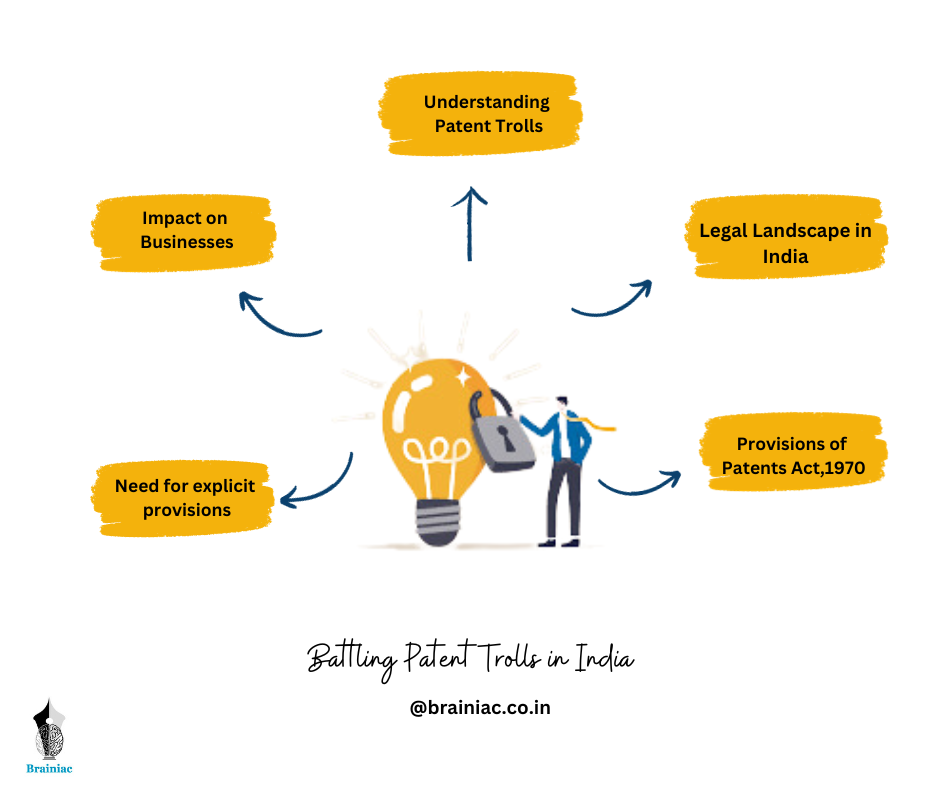Introduction
In the fast-paced world of innovation and technology, patents serve as the guardians of creativity and ingenuity. They protect the ideas and inventions that shape our future. However, lurking within this realm of intellectual property are entities that operate differently, known as patent trolls or non-practicing entities (NPEs). These peculiar entities acquire patents not to foster innovation but with the sole intent of wielding them as weapons in legal battles against alleged infringers. This contentious practice has raised alarms globally for its potential to suppress innovation and inflict harm on businesses. In this article, we’ll explore patent trolls and patent lawsuits in the context of Indian law, focusing on their impact on innovation and commerce.
Understanding Patent Trolls
Patent trolls, often referred to as non-practicing entities (NPEs), are entities that acquire patents without any intention of utilizing them for product development or innovation. Instead, they leverage these patents to threaten legal action against other companies, alleging patent infringement. The primary goal is to extract settlements or licensing fees from these companies. Patent trolls thrive on the fear and uncertainty associated with patent litigation. They frequently target companies of varying sizes, from startups to industry giants, with the prospect of costly legal battles. The aim is to force these companies into settlements rather than engage in lengthy and expensive court battles.
Impact of Patent Trolls on Businesses
Stifling Innovation: Patent trolls create a climate of fear among companies, making them reluctant to innovate out of fear of being sued. This fear can act as a roadblock, slowing down progress, and hindering the development of new ideas and technologies. When businesses are constantly worried about potential lawsuits, they are less likely to invest in research and development.
Deterring Investment: The presence of patent trolls can deter investors from supporting new companies. Investors are wary of putting their money into ventures that may become entangled in costly legal disputes with patent trolls. This hesitance to invest can make it challenging for startups and small businesses to secure the funding needed to grow and succeed in the competitive marketplace.
Financial Burden: Engaging in legal battles with patent trolls can be financially draining. The costs associated with litigation, including legal fees and potential damages, divert resources that could otherwise be used for creating new products, expanding operations, hiring employees, or investing in research and development. This financial strain is especially burdensome for small businesses, startups, and entrepreneurs who may lack the resources to mount a robust defense.
Legal standing in India
India’s patent law, governed by the Patents Act of 1970, may not directly mention patent trolls, but it does contain rules that indirectly discourage their activities. According to Section 146(1) of the Patents Act, patent owners must show that they are putting their patents to use within India. If they don’t use their patents in India for three years, the government can allow others to use them through compulsory licensing. Secondly, patent holders must submit a yearly report about how they are using their patents. Not doing so can lead to fines and even imprisonment. This rule discourages the hoarding of patents solely for legal battles.
Measures to combat Patent Trolls
India has put several measures in place to combat patent trolling effectively while fostering an environment that supports innovation:
Patent (Amendment) Act of 2005: This amendment specifically addresses concerns related to patent trolls, especially in the software sector. It provides protection against activities that misuse software patents for trolling purposes.
Section 84(7)(d) of the Patents Act, 1970: This section highlights that if a patent remains unused or is not fully employed for commercial purposes in India, it no longer serves the public interest. Consequently, the law allows such patents to be revoked, emphasizing the need for patents to contribute to the nation’s economic well-being.
Pre-Grant and Post-Grant Opposition: India’s patent system allows for challenges, even after a patent has been granted. The Post-Grant Opposition provision enables challenges based on various grounds, including questioning the patent’s originality and obviousness.
Need for Explicit Provisions
While India’s patent law has indirectly tried to deter patent trolls, there’s a clear need for more direct and specific rules to tackle this global problem. Unlike some other places, India’s Patent Act of 1970 doesn’t have special rules that clearly identify and deal with patent trolls. This gap can lead to confusion and legal tricks, making it tough to fight patent trolling effectively.
To make the rules clearer and stronger, the law makers should consider adding specific provisions that define patent trolling and lay out clear penalties for those who do it. These rules should also keep up with the changing tactics of patent trolls in today’s digital world, especially in areas like software and technology.
Conclusion
Patent trolls and patent disputes have significant effects on innovation and businesses, even in India. While the government has taken steps to address these issues, the evolving nature of patent law and litigation means that continuous efforts are needed to find the right balance between protecting patents and preventing misuse.
To support innovation and businesses, it’s crucial for Indian lawmakers, courts, and stakeholders to keep working together to improve the legal system. They must ensure that patent trolls don’t hinder India’s progress in innovation and technology.


